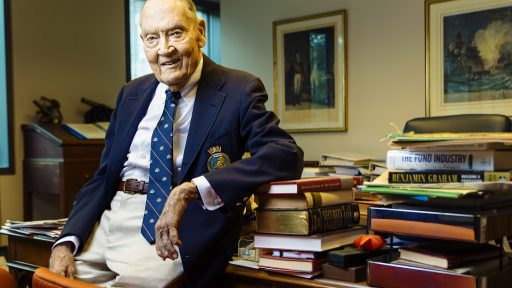- Home
- >
- Great Traders
- >
- Jack Bogle’s path to founder of the world’s largest private asset manager was not a straightforward rise

Jack Bogle's path to founder of the world's largest private asset manager was not a straightforward rise

Jack Bogle's path to founder of the world's largest private asset manager was not a straightforward rise, as he charts in a book "Stay the Course: The Story of Vanguard and the Index Revolution."
Now called the father of index funds, Bogle even briefly struggled with math in high school, scoring 40% on his first algebra test - but he ended the year with a 100 on his final exam.
As a Princeton University student, he found his early years challenging. His first semester saw a report card of three Cs and a D+, which he worked up to Bs and As.
In the fall of his sophomore year, Bogle took his first course in economics, earning a D+ on his midterm. A scholarship student dependent on good grades, he "pressed on as best I could," knowing his Princeton career hung on not failing the course. Bogle ended the semester with a C-, good enough to stay at Princeton.
Eventually, he wrote a senior thesis graded an A+.
After graduation in 1951, he joined Philadelphia's Wellington Management Company, lured by chief executive officer Walter Morgan, another Princeton alumnus who admired Bogle's senior thesis. Bogle worked with every part of the company - administration, marketing and distribution, securities analysis, and shareholder relations. Within a decade, he was viewed as Morgan's likely successor and assumed that he would stay at Wellington "forever."
In 1965, Bogle took over as CEO at age 35 and quickly decided that Wellington should merge with a less-conservative firm. His fourth choice, Thorndike, Doran, Paine & Lewis, accepted, with those four partners holding 40% of the merged firm's shares. Initially, the 1966 merger seemed a success: Bogle and his new partners were featured on the cover of Institutional Investor magazine with the tag: "The whiz kids take over at Wellington."
As Bogle tells it, they "whizzed high for a few years" despite his initial fear that peace with his partners would not last. Bogle stayed on as CEO until the 1973-74 bear market ravaged the firm, causing $1.5 billion of outflows in the firm's signature fund and a plummeting share price.
"My Boston partners quickly found a scapegoat. Not among themselves, despite their responsibility for the terrible performance of the mutual funds whose portfolio they managed," he wrote.
Rather, the partners chose the man who initiated the merger and who gave up substantial voting power: Bogle. They fired the CEO on January 23, 1974 in what Bogle called "the most heartbreaking moment" of his entire career.
Bogle then engineered a turnaround without precedent: as chairman of Wellington's 11 mutual funds, he proposed that the funds separate from Wellington. The outcome was far from certain, with the New York Times running a headline "Ex-Fund Chief To Come Back?" His initial proposal died, but he reached a compromise, with the Wellington funds creating a new subsidiary company focused on fund administration - what would become Vanguard.
The company started with 28 employees and eventually gained the ability to oversee investment management and share distribution.
"My goal was ultimately to build a broad-based firm, and I took on my new leadership role the same way I had left my previous leadership role: 'Fired with enthusiasm,'" Bogle wrote.
44 years later, Vanguard has more than 40,000 employees and $5.1 trillion in assets.
Source: BI
 Trader Georgi Bozhidarov
Trader Georgi Bozhidarov Read more:
If you think, we can improve that section,
please comment. Your oppinion is imortant for us.











